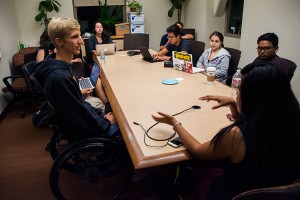USG discusses improving accessibility
On Tuesday night, Undergraduate Student Government held an event that allowed students to voice their opinions on improving accessibility for students with disabilities on campus. Vice President Rini Sampath,University Affairs Director Jordan Fowler and Assistant Director of Diversity Affairs Andy Su led the discussion. Topics covered at the presentation included building renovation, campus athletics, accommodations and academic policies for students with disabilities.

Making change · Sophomore economics major Zack Wentz (above) was the impetus behind the meeting that was held Tuesday evening. – Mariya Dondonyan | Daily Trojan
Zack Wentz, a sophomore majoring in economics, inspired USG to hold the event. While pledging the leadership fraternity Delta Omicron Zeta, he was asked to create a presentation about an issue on campus. He presented it to Sampath, who recognized his passion for improving accessibility on campus and brought the issue back to USG.
Wentz, a recipient of the Swim with Mike scholarship, was paralyzed from the chest down six years ago. The mission of the scholarship is to enable athletes who have endured tragedy to complete their education and realize their full potential.
Wentz said that ever since he applied to USC, it has been a vision of his to see disabled students play a basketball game or a football game — to see students with disabilities compete and play together. Wentz feels that USC does not provide the resources necessary for disabled students to not only play the sports they love, but also get into certain buildings or classrooms feasibly.
“I am an athlete and many of the athletic facilities are extremely out of date. For example, my sport growing up and the sport my scholarship is based on is tennis, and I can’t even go watch the men’s or women’s tennis matches because there is zero viewing access. There is no elevator, only stairs, to the viewing area.”
Wentz also said that students with disabilities don’t have the same opportunities as other students when it comes to viewing football games.
“And then, the Coliseum, while there is accessible seating, it’s not at the heart of the action,” he said. “It’s not near the student section. And also for classrooms, there are some classrooms in which the only option for seating for students with disabilities is a giant coffee table at the front of the room right next to the professor. There just should be better options.”
Keshan Sirimane, a sophomore majoring in international relations (global business), mentioned issues with accessibility at certain USC apartments.
“There are a lot of loopholes that USC jumps through as far as accessibility in off-campus housing. There are limitations that USC does have,” Sirimane said. “We want to renovate all these buildings, but like for my apartment, Regal Trojan, if they wanted to just put a ramp in, they would have to go to the city and get it approved. It would be a mess, according to Housing, that USC wouldn’t be able to afford.”
Sampath talked about potential projects to put proposals in place to improve accessibility on campus. These proposals included renovating current housing options, getting people with physical disabilities access to the front row of the student section in the Coliseum and trying to organize a basketball game for people in wheelchairs, possibly through a partnership with the Swim with Mike organization. She also mentioned that USG, ideally with some student advocates, will have a meeting with Pat Haden, USC’s athletic director, about improving accessibility in athletic facilities.
Making sure that accessibility is at the forefront of concerns for USC was another topic of discussion at the meeting. Students felt that not only should newly built buildings be fully accessible for students with disabilities, but renovation of old buildings should also be a main concern.
Wentz thinks that the best first step in raising awareness for the improvement of resources for students with disabilities is the event he has coordinated with USG. He hopes that after this event, people will eventually see the issue the way he sees it now.
Fowler said that she, Sampath and Su had all been recently approached by students who had concerns about accessibility for disabled students on campus. The three USG members felt that it would be best to hold this event in order to bring all of those students together, define the problem and possible solutions, so they can move onto the next step.
“It’s really easy to have a problem and just complain about it and not go to anybody,” Fowler said. “But these students saw USG as a resource and an outlet for serious change to occur for them. We want them to be in those meetings with us. We’re not going to just take this project and run with it. We want them to be an integral part in the solution. We just have some of the connections to make it happen.”
Sampath is positive that USG, with the help of these students, can affect change.
“Our individual responsibility is to push the administration and say, ‘Why not?’” Sampath said, “Why not? That is their job. If we make enough student noise, they have to do it. As long as we are able to consolidate this information and we create an action plan, we can make it happen.”
Fowler talked about her opinion on these students not having the resources that should be available.
“It’s heartbreaking. You don’t really think about it if you’re able bodied, but if you’re limited based on your circumstances to entering certain areas, that’s uncomfortable and unfair,” Fowler said. “This conversation will be great because even though [USC] is doing the best they can do, it’s not promoted well enough, and these students can help get the word out.”

